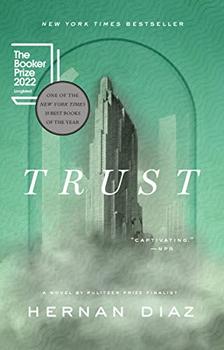Summary | Excerpt | Reading Guide | Reviews | Beyond the Book | Readalikes | Genres & Themes | Author Bio

Within a year, tired of his advisor's priggishness and ponderous pace, Rask decided to start trading on his own account and dismissed Winslow. Severing all ties with the family that had been so close to his for two generations was an added satisfaction to the feeling of true achievement Rask experienced, for the first time in his life, when he took the reins of his affairs.
*
The two lower floors of his brownstone became a makeshift office. This transformation was not the result of a plan but, rather, the effect of meeting unforeseen needs one by one, as they came, until, unexpectedly, there was something like a workspace filled with employees. It started with a messenger, whom Benjamin had running all over town with stock certificates, bonds, and other documents. A few days later, the boy let him know he had to have help. Together with an additional messenger, Benjamin got a telephone girl and a clerk, who soon informed him he was unable to cope on his own. Managing his people was taking vital time away from Benjamin's business, so he hired an assistant. And keeping books simply became too time-consuming, so he engaged an accountant. By the time his assistant got an assistant, Rask stopped keeping track of the new hires and no longer bothered to remember anyone's face or name.
The furniture that had remained untouched and under covers for years was now handled irreverently by secretaries and errand boys. A stock ticker had been installed on the walnut serving table; quote boards covered most of the gilt-embossed foliage wallpaper; piles of newspapers had stained the straw-yellow velvet of a settee; a typewriter had dented a satinwood bureau; black and red ink blotched the needlework upholstery of divans and sofas; cigarettes had burned the serpentine edges of a mahogany desk; hurried shoes had scuffed oak claw feet and soiled, forever, Persian runners. His parents' rooms were left intact. He slept on the top floor, which he had never even visited as a child.
It was not hard to find a buyer for his father's business. Benjamin encouraged a manufacturer from Virginia and a trading company from the United Kingdom to outbid each other. Wishing to distance himself from that part of his past, he was pleased to see the British prevail, thus sending the tobacco company whence it had come. But what truly gratified him was that with the profits from this sale he was able to work on a higher plane, manage a new level of risk, and finance long-term transactions he had been unable to consider in the past. Those around him were confused to see his possessions decrease in direct proportion to his wealth. He sold all remaining family properties, including the brownstone on West 17th Street, and everything in them. His clothes and papers fit into two trunks, which were sent to the Wagstaff Hotel, where he took a suite of rooms.
He became fascinated by the contortions of money—how it could be made to bend back upon itself to be force-fed its own body. The isolated, self-sufficient nature of speculation spoke to his character and was a source of wonder and an end in itself, regardless of what the increasing numbers represented or afforded him. Luxury was a vulgar burden. The access to new experiences was not something his sequestered spirit craved. Politics and the pursuit of power played no part in his unsocial mind. Games of strategy, like chess or bridge, had never interested him. If asked, Benjamin would probably have found it hard to explain what drew him to the world of finance. It was the complexity of it, yes, but also the fact that he viewed capital as an antiseptically living thing. It moves, eats, grows, breeds, falls ill, and may die. But it is clean. This became clearer to him in time. The larger the operation, the further removed he was from its concrete details. There was no need for him to touch a single banknote or engage with the things and people his transaction affected. All he had to do was think, speak, and, perhaps, write. And the living creature would be set in motion, drawing beautiful patterns on its way into realms of increasing abstraction, sometimes following appetites of its own that Benjamin never could have anticipated—and this gave him some additional pleasure, the creature trying to exercise its free will. He admired it and understood it, even when it disappointed him.
Excerpted from Trust by Hernan Diaz. Copyright © 2022 by Hernan Diaz. All rights reserved. No part of this excerpt may be reproduced or reprinted without permission in writing from the publisher.
Your guide toexceptional books
BookBrowse seeks out and recommends the best in contemporary fiction and nonfiction—books that not only engage and entertain but also deepen our understanding of ourselves and the world around us.